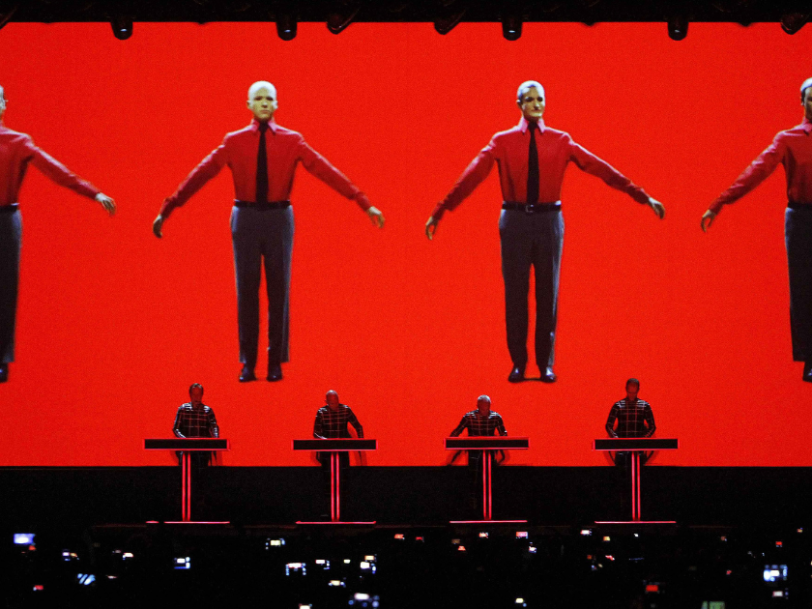Long celebrated for their visionary approach to experimental music-making, Germany’s synth-pop voyagers Kraftwerk have always led the way when it comes to exploring the outer reaches of sonic innovation. In the 70s, ventures such as the hymn to European rail transport that was 1977’s Trans-Europe Express and the contemplation of humanity’s interfacing with technology in the following year’s The Man-Machine cemented Kraftwerk’s status as pioneers in the realm of electronic music. However, it was with the release of Computer World, in 1981, that the group would embark upon a daring leap into the future, offering a prescient glimpse into the technological landscape that would come to define the 21st century.
Here is the story of how Kraftwerk went beyond the binary and heralded the advent of our digital age…
Listen to ‘Computer World’ here.
The backstory: “We feel very much encouraged to hear that there’s a lot of energy in electronic music happening in England”
By the late 70s, Kraftwerk had successfully blazed a trail for a bold new generation of synth-driven pop acts. The band’s groundbreaking run of hugely influential albums, from Autobahn (1974) to The Man-Machine, had ushered in a brave new world in which the use of synthesisers and drum machines was no longer a novelty pursuit. Instead, it was wholeheartedly embraced by a legion of young new-wave upstarts such as Orchestral Manoeuvres In The Dark and The Human League. “We feel very much encouraged to hear that there’s a lot of energy in electronic music happening in England,” Kraftwerk’s Ralf Hütter said in a 1981 interview with BBC Radio 1. “Because the last time we came here – six years ago – we were attacked for what we were doing at that time.”
Now facing an army of acolytes building upon their innovative sound and carrying electro-pop into the 80s, it’s no surprise that Kraftwerk’s eighth studio album, Computer World, was considered a tantalising and much-anticipated prospect. Having been anointed by the music press as the godfathers of synth-pop, Kraftwerk’s reputation for cutting-edge sounds left them poised to make further commercial inroads that would have been unthinkable several years beforehand. They had always been critics’ darlings, but now was the perfect time for Kraftwerk to make their biggest breakthrough yet.
- ‘Radio-Activity’: How Kraftwerk Went Nuclear With Their Fifth Album
- ‘Electric Café’: How Kraftwerk Took On ‘Techno Pop’
- ‘Tour De France Soundtracks’: Kraftwerk’s Gear-Changing Final Album
Despite occupying a crowded playing field of like-minded synth-pop pretenders aping their sound, the crown was clearly Kraftwerk’s for the taking. But, given the group’s perfectionism, everything had to be fine-tuned. From the concept all the way down to its use of analogue synthesisers and sequencers, Kraftwerk’s eighth album would give the German four-piece the perfect opportunity to unleash their unique vision of the future upon the world.
The recording: “The pieces in many ways ‘compose themselves’ by us finding sounds from experimenting”
Like scientists on a never-ending quest for discovery, Kraftwerk recorded Computer World in their “laboratory” at Düsseldorf’s Kling Klang studios across a three-year period. For their follow-up to The Man-Machine, Ralf Hütter, Florian Schneider, Karl Bartos and Wolfgang Flür spent long hours honing the songs by tinkering around with futuristic sound effects on Moogs and Prophet-5 synthesisers. “The pieces in many ways ‘compose themselves’ by us finding sounds from experimenting with interfacing and settings,” Hütter told Electronics & Music Maker magazine. “During the week, we work from 5pm until one or two at night.”
Over time, an overarching concept for Computer World began to emerge. Despite the technology being much less advanced than it is today, Hütter and Schneider noticed how computers were forming the backbone of government operations, with mainframe models such as the IBM System/370 series being used to handle large-scale processing tasks such as census-data analysis and financial transactions. The threat posed by the collection of personal data by police authorities – particularly in Germany, where mistaken arrests were commonplace in the wake of the terrorist bombing of Oktoberfest in 1980 – was looming. “It wasn’t a warning,” Hütter later said, “it was reality.”




